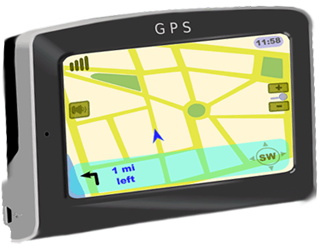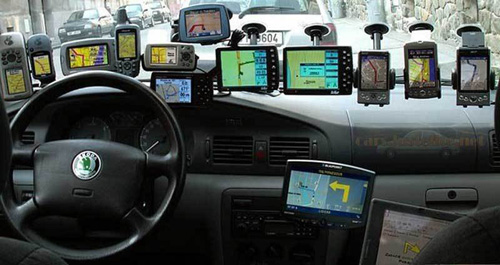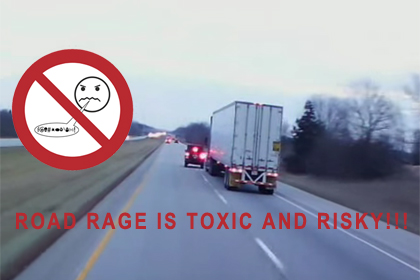
Article by Igor Gavric

Blocking field of view… Ok, maybe by not so many, but we have all seen drivers
who mount their 55″ GPS screen directly in their field of view.
Truck Drivers and GPS
What a great age to be alive as far as technological advances go. We have more gadgets than ever before, serving us with something as little as being able to locate a truck stop with specific services, to something as big like keeping in better touch and communication with our families while driving down the big road. Ability to get quick advice from anything the internet offers, to being able to stay educated when on break from the many "how to's" of You Tube.
While all these things are amazing, so is the accuracy of our global position, often being able to pin down the truck within 3 feet from where the sensor is located, or closer. It is meant to help drivers find their way to customers, truck stops, scales, warn of traffic, etc. without having to listen to the local radio or purchase maps. All great things, however, there is a large scale problem with all this. Like all other electronics out there, they can sometimes misbehave, or can route you 300 miles out of route, point you at a wrong border crossing, etc. All of which costs money and extra time.
I work as a safety manager at a commercial transportation company, and have heard a lot of stories from drivers complaining how their GPS device sent them out of route, and have also been on the road for 15 years, and had experience myself where my GPS device was taking me out of route.
Please, allow me to give you some advice:
First advice is to purchase a map of the entire area where you plan to travel. By map, I mean an atlas, and by atlas, I mean the paper or laminated kind. My personal preference is Rand McNally Motor Carriers’ Atlas. Not because I am a spokesman or salesman of the product (I am not in any way affiliated), but because I find it has all the information, compiled inside it, which you need while operating you big rig down the road. From locations of low bridges, to highway restrictions. The laminated kind is best, as it will keep from shredding, and can be folded for better viewing, drawn upon, etc.
Second advice is to purchase a good GPS Device, preferably the one meant for your type of vehicle, and for the sake of all that is holy, please, let the stadiums keep their giant screens. You don't need a 40” TV monitor on your dash. Keep it small enough so you can still see out the darn windshield.
Third advice goes as follows: When you're issued your route/address to where you're headed, by all means, reach for your GPS Device and enter it. Make sure you also enter your vehicle's dimension and weight, so the device may help you. Once entered, ensure the route it is taking you on is what your carrier prefers, and also the route you agree with by hitting the “Review Route” button on your GPS Device (name of button may vary). Compare the route it is taking you on against your road atlas and memorize the route you need to take, or write it down somewhere where you can glance at it (I used a dry erase marker on top corner of windshield where it was not obstructing view until I got good at it).
Make sure, the route is the one your carrier prefers you take. There are reasons why they want you to take certain routes. The reasons may vary. It may be more toll money, no permits for certain states or provinces, harder route on fuel mileage, specific use of border crossing, etc.
Learn how to use the map vs. GPS Device. It will save you a lot of frustration, and a lot of your carriers’ frustration in the process. Educate yourself and do not head blind onto the big road. Use the time while loading or on break to pre-plan your route so you're not rushing last minute. Perform a risk assessment on the route you plan on taking so you know what to expect.
Our Selection of Favorite Quotes for Truck Drivers
“ Never let anything mechanical know you are in a hurry. ”
Andrew Ross
“ Driving is a spectacular form of amnesia. Everything is to be discovered, everything to be obliterated.”
Jean Baudrillard
“ A bad attitude is like a flat tire. You can't go anywhere until you change it. ”
Author Unknown
“ We can’t solve problems by using the same kind of thinking we used when we created them. ”
Albert Einstein
“ Accidents, and particularly street and highway accidents, do not happen — they are caused. ”
Ernest Greenwood
“ The important thing is not the miles you've driven, but what you've driven into your head with those. ”
Author Unknown
“ Driving is a spectacular form of amnesia. Everything is to be discovered, everything to be obliterated. ”
Jean Baudrillard
“ If you don't understand yourself you don't understand anybody else. ”
Nikki Giovanni
READ ARTICLES

Eat Healthier While on the Road
Article by Igor GavricBefore you head down the road, figure out how far you might be able to go, and plan out when and where you're going to eat along your route. Some of the bigger truck stops offer healthy food alternatives, and some may have a mini grocery section where you can...

What Can Clean Truck Do for You
Article by Igor GavricKeeping your truck clean has many benefits and will not only preserve it better from the elements, but it can also have a healthy affect on your mood and self perception. You can avoid expensive cleaning products and enjoy a well maintained truck by making use of...

Road Rage is Toxic and Risky
Article by Igor GavricRoad rage or aggressive driving is not a new problem in our society and what is very alarming is the fact that incidents of aggressive driving have increased dramatically. Although there are many causes of road rage, most experts agree, a leading factor is...
